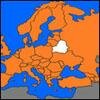Другие материалы рубрики «English»
-
 Presidential election set for October 11
Presidential election set for October 11
The House of Representatives of the Belarusian National Assembly unanimously voted Tuesday to set October 11 as the date for a presidential election. -
 Human rights groups condemn European Olympic Committees for “sportswashing” human rights abuses in Azerbaijan
Human rights groups condemn European Olympic Committees for “sportswashing” human rights abuses in Azerbaijan
The coalition also condemns EOC President Patrick Hickey for praising the Azerbaijani leader, Ilham Aliyev.
- Karatkevich seeking to stage three demonstrations in Minsk on July 15
- Top election official expresses hope that coming presidential election campaign will not be boring
- Yarmoshyna pledges to try to give foreign election observers no cause for criticism
- Tatsyana Karatkevich set to collect 120,000 ballot-access signatures
- Quarter of adult Belarusians are smokers, official statisticians say
- Rescuers stage massive exercise at sports center in Minsk
- Revelers in Minsk celebrate end of Butter Week
- Leaders of France, Germany, Russia, Ukraine arrive in Minsk for summit on Ukraine crisis
- United Kingdom’s Visa Application Center in Minsk moves into permanent office
- Minsk residents paying tribute to victims of Charlie Hebdo massacre in Paris
English
Public Bologna Committee presents report on Belarus’ readiness to join European Higher Education Area
A group of Belarusian experts and civil society activists called the Public Bologna Committee on January 16 presented an alternative report on the Belarusian education system’s readiness to join the European Higher Education Area (EHEA).

The report was sent to the EHEA secretariat in December, one month after Belarus formally applied to join the Area for the second time, Uladzimir Dunayew, a member of the Public Bologna Committee, told reporters on Friday. European education ministers are expected to consider Belarus’ application at a conference this May.
The report acknowledges that Belarus has made certain progress in carrying out higher education reforms, but there have been no positive changes in regulations and the practice of the implementation of fundamental European academic values.
Mr. Dunayew said that the level of institutional autonomy, academic freedom and participation in higher education governance has not been raised since 2011. There have been a number of instances of academic repression at Belarusian universities, he stressed.
In Belarus, rectors are still not elected, while university administrations’ practice of concluding short-term contracts with faculty makes the latter dependent on administrators. There are no conditions for student mobility in the country, said Mr. Dunayew.
Pavel Tserashkovich, another member of the Committee, said that there were few opportunities for Belarusian students and professors to travel abroad under academic exchange programs. “If students and professors go abroad for training, this is thanks to European support programs. Belarusian universities’ international ties are very weak, while most of their partners are minor foreign schools of higher learning,” he said.
The Public Bologna Committee believes that a roadmap for Belarus’ accession to the EHEA should be drawn up through joint efforts of the parties concerned.
Belarus formally applied to join the European Higher Education Area in December 2011. At a meeting held in Copenhagen in January 2012, the Bologna Follow-Up Group blocked Belarus’ bid to join the Bologna Process for three years. According to the Group’s assessment, Belarus did not respect the principles and values of the Bologna Process such as academic freedom, institutional autonomy and student participation in higher education governance.




В настоящее время комментариев к этому материалу нет.
Вы можете стать первым, разместив свой комментарий в форме слева